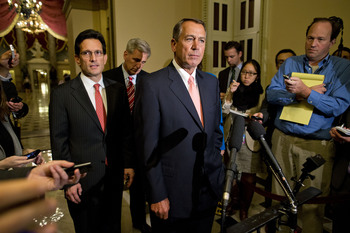|
Government Lies, Corruption and Mismanagement

Who Does Fund the Dissidents?
The 20 dissident Republican House members that the New York Times has branded as being some of the loudest rabble-rousers -- on the shutdown and other issues -- have little financial reason to heed the demands of their party's leadership; they don't receive much campaign money from top GOP House members or from the party's fundraising arm, the National Republican Congressional Committee
Who Does Fund the Dissidents?
by Doug Weber and Russ Choma on October 4, 2013 4:41 PM LINK Yesterday, we established that the 20 dissident Republican House members that the New York Times has branded as being some of the loudest rabble-rousers -- on the shutdown and other issues -- have little financial reason to heed the demands of their party's leadership; they don't receive much campaign money from top GOP House members or from the party's fundraising arm, the National Republican Congressional Committee In a town where money handed out to other members helps create alliances and builds a party leader's machine, these 20 owe Speaker of the House John Boehner (R-Ohio) and his No. 2 Majority Leader Eric Cantor (R-Va.) very little. So if it's not the party leadership in Washington keeping the dissidents' campaign coffers full, who is it? A top source of campaign cash for Republicans overall in recent years has been the securities and investment industry -- Wall Street. In 2012, this industry gave more to candidates than any other except one, and 69 percent of its money went to Republicans. And Wall Street is, by far and away, the top source of campaign cash for the Republican House leadership. In 2012, Boehner's campaign and leadership PAC received $1.6 million from the industry; the industry that came in second (oil and gas) only gave about half that. (This excludes the catch-all industry of "retired.") In the first half of 2014, securities and investment gave Boehner's campaign and leadership PAC about $530,000 and continues to lead his top industries list. Like Boehner, Cantor also received more from that industry than any other -- about $466,000 sent to his campaign committee and leadership PAC. In 2012, the industry gave 239 House Republican candidates about $16 million, or, on average $67,175 apiece. So, what about our dissidents? Nineteen of the 20 received money from the industry in 2012 -- Rep. Steve Stockman (R-Texas) is the only one who's come up dry, according to our data -- but on average only received $20,618. That's less than a third of the House GOP average from Wall Street. Similarly, so far in 2014, the industry has helped fund 182 Republican House candidates; the average, per recipient, is $17,078. Seventeen of the 20 dissidents have received contributions from Wall Street, but they're averaging only $2,985. Not only is that far below the industry's average to their peers, it's also well behind the average amount given to Democratic recipients -- about $11,963. So, if it's not leadership funding these 20 dissidents and it's not the House Republicans' biggest source of campaign cash, who is it? According to a CRP analysis, the top donors industries for these 20 don't vary widely from the list of top industries giving to Republicans in general. But the average amount given does seem to. The oil and gas industry has given 192 House Republicans campaign cash in 2013, on average about $17,500 apiece. Most of the 20 dissidents have gotten money from the industry as well, but, on average, only about $11,500 each. The trend appears to be that, by and large, these 20 dissidents are simply raising less money than their colleagues. According to CRP data, Republican House members have raised an average of $331,000 in campaign funds so far this year. A review of these 20 dissidents shows that, on average, they have raised $301,000. The group includes Rep. Phil Gingrey (R-Ga.), who is running for Senate in 2014; he's raised about $1.1 million so far this year. Excluding Gingrey from the pool, because fundraising levels for Senate candidates are often much higher than for their House colleagues, the remaining 19 have brought in, on average, $259,000. It may be months before data showing whatever funds members of Congress are raising this week is available, but -- at least through the first six months of the year -- these 20 dissidents seem to be lagging behind when it comes to fundraising. Follow Russ on Twitter: @russchoma |
||||
© 2003 The E-Accountability Foundation![]()

